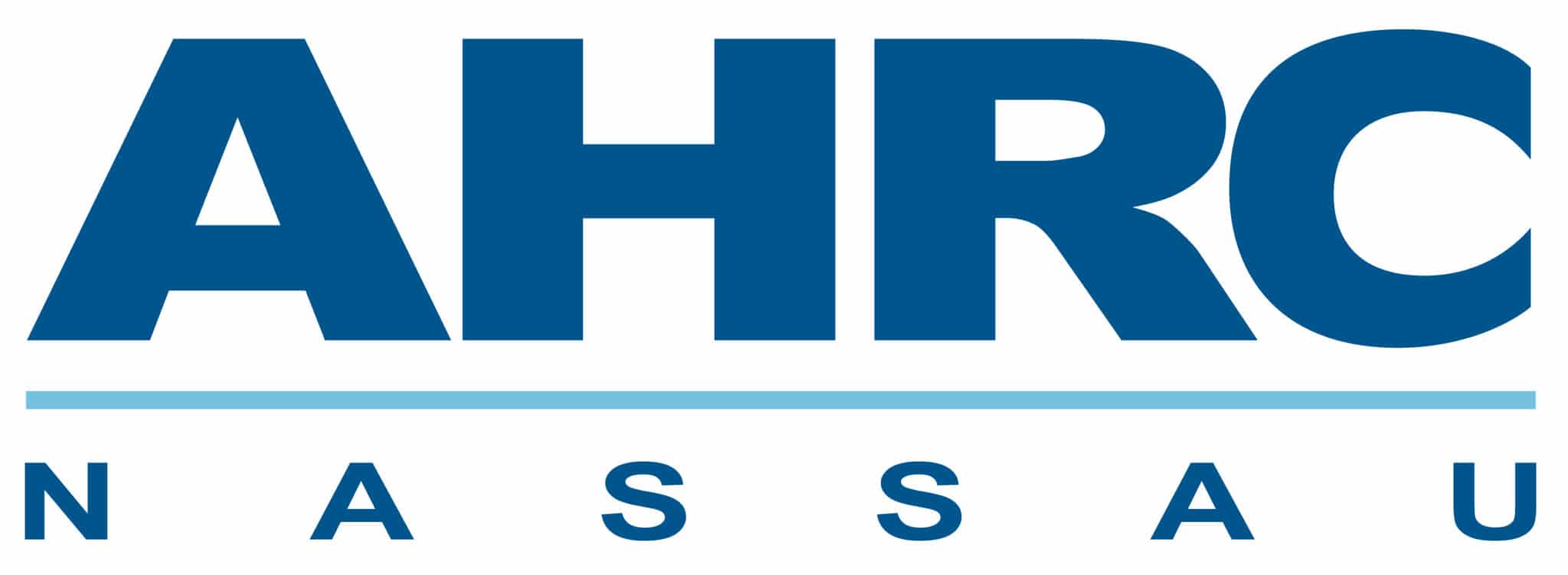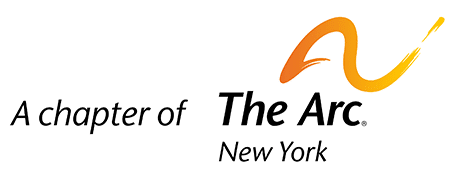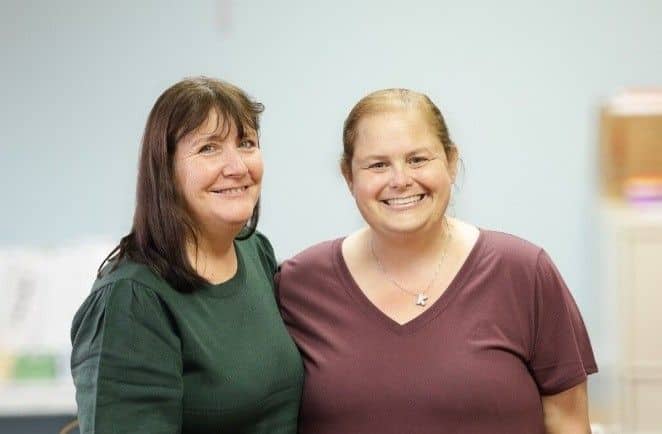 With a catheter strapped to her chest, Krystie Damsker would smile, give high fives, and finish paperwork as Assistant Manager at AHRC Nassau’s Bethpage day services site.
With a catheter strapped to her chest, Krystie Damsker would smile, give high fives, and finish paperwork as Assistant Manager at AHRC Nassau’s Bethpage day services site.
Supporting people with developmental disabilities was the work she’d loved for over 20 years, her “calling,” and where she’d met some of her closest friends. It was also where she experienced kidney failure twice, endured dialysis, and ultimately was matched with a lifesaving kidney thanks to her friend and co-worker Jerri Walker, Volunteer and Project Coordinator.
A year after her transplant, Krystie shared her story during a lunch break, speaking from her car outside the hubsite. As she spoke, people she supports would occasionally tap on her windows or wave hello. At one point, a person called from vacation from Texas, just to catch up—a testament to the deep relationships she’s built.
The Impact of Kidney Failure
According to the National Kidney Foundation (NKF), Krystie is one of the roughly 250,000 people currently living with a kidney transplant. Approximately 100,000 people are waiting for a transplant, while over half a million receive dialysis treatments.
“This is an underdiagnosed condition, kidney disease,” said Dr. Kirk Campbell, Professor of Medicine and Chief of the Renal Division at the University of Pennsylvania Perelman School of Medicine and NKF Board President. “We really want to encourage more awareness, screening, and talking to loved ones about living donation.”
“The kidneys are quite essential to supporting overall immune health in a number of different ways that aren’t always fully appreciated,” said Dr. Campbell.
Kidneys filter blood, eliminating waste and water through urine. However, Dr. Campbell explained “these organs do a lot more than that, serving as a filter that balances salt and acid in the body. They also control blood pressure, produce hormones that regulate red blood cell counts, and support bone health.”
Kidney failure leads to waste and fluid buildup, as well as “fatigue and nausea, mental fog and a lot of cardiovascular, heart and central nervous system complications that ultimately can be quite dangerous and fatal,” said Dr. Campbell.
Living With Kidney Disease
Since starting at AHRC in 2004, friends and coworkers say Krystie has remained the same bubbly, positive person, even while coping with the major health challenges.
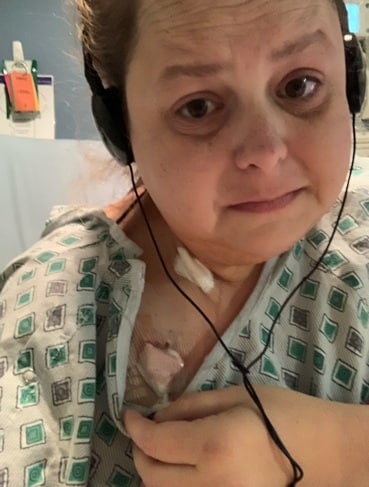 “Her first transplant was extremely challenging to watch. Her strength behind it really is inspiring,” said Tina Rodriguez, a longtime friend and AHRC co-worker. “There were many times she just wanted to cry and we let her. And then we told her how strong she was.”
“Her first transplant was extremely challenging to watch. Her strength behind it really is inspiring,” said Tina Rodriguez, a longtime friend and AHRC co-worker. “There were many times she just wanted to cry and we let her. And then we told her how strong she was.”
Krystie’s mom, Basia, shared, “She takes after me. She’s a good soul. Even after going to dialysis until 11 at night, she still loved her guys and would do anything for them.”
Krystie has always loved the energy of the hubsite, teaching people with disabilities how to build connections and be a part of their community. When she started, mornings might be spent volunteering and afternoons at the arcade, beach, or movies, supporting people with developmental disabilities to pursue their interests in the community and advocate for themselves.
After her first transplant began to fail, her close-knit environment was another reason she pushed through four-hour dialysis sessions, three to four times week.
Krystie was on hemodialysis for over a year, traveling to the NYU Langone Dialysis Center in Bethpage, the halfway point between her home and work. In 2023, Dr. Nicole Ali, Medical Director of the Kidney Transplant Program and Director of Quality for the Transplant Institute at NYU Langone, started working with Krystie, as her transplant nephrologist assisting with organ matching and immunosuppression, when her first transplant—donated by her mother—began to fail.
“With Krystie, dialysis was very, very difficult, and that happens to many patients,” remembered Dr. Ali. “The amount of fluid that would be removed by your kidney in two days you’re consolidating that on dialysis to three or four hours.”
“Over the course of time, even with the immunosuppressant medications, the immune system does recognize that the trans[1]planted kidney is not something they were born with,” explained Dr. Ali. “A slow immune injury happens to that organ. And then, over the span of 20 or 30 years, the organ gets scar tissue. That’s why they don’t last forever.”
Dialysis was a short-term measure, but a challenging one. On dialysis, Krystie felt fatigue, nausea, high blood pressure, and frequently shivered. The cool temperature of the dialysis room prevented blood clotting while the machine whirred cleaned, cold blood back into her body.
“One day her left foot turned colors and it started to burn and have a big rash on it,” said Dr. Ali. “And they were worried that a plaque of cholesterol from her blood vessels had fallen off and gotten to her foot. I couldn’t imagine at her young age to think, ‘Oh my gosh, the blood flow to my foot is blocked.’ She was having a very tough time.”
Krystie had avoided dialysis with her first transplant; now she had what Dr. Ali likened to a second “full-time job,” factoring in travel, waiting room time, especially if blood pressure was low and her body needed to stabilize after treatment. This is in addition to the CT scan, X-ray, colonoscopy, Pap smear, mammogram, and cardiology consult needed to go onto the waiting list for a transplant.
Krystie felt confident working with Dr. Ali and her multidisciplinary team at NYU Langone. Joan Kelly, Transplant Coordinator, and Colleen Kelly, Assistant Coordinator, managed all testing and overlapping work of the larger team, including the transplant surgeon, social workers assisting with Krystie’s mental health and emotional journey, a pharmacist, and finance specialist.
Their ongoing support, Krystie said, made her feel confident to advocate for herself in situations ranging from a cardiovascular team seeking to crack her chest open to remove fluid build-up or saying no to surgery for a fistula, connecting an artery or vein.
“Krystie would come to us and say, ‘Hey, this is what’s going on. Can you help me?’ And since she knew exactly who I’d have to talk to or coordinate with, it was very easy,” remembered Dr. Ali who encourages patients to keep notes on diagnoses, doctors, and hospitals because “timelines can start to blur.”
Another big reason for Krystie’s success through the challenges of dialysis was her mom, Basia.
“In Krystie’s case and in every patient’s case, the most important part of their team to me is their support. For Krystie, that was very much her mom. You need that person who grounds you, who you can pick up the phone and call when things are not going well, when you’re having a bad day, when you’re like, ‘I just don’t want to go do this test tomorrow.’ That person really is your cheerleader and gets you through the tough times.”
A Life-Changing Friendship
Krystie knew her life was on the line. She asked questions, got second opinions, and prepared for good and bad outcomes. Above all, Krystie did her best to continue living her life.
 “If you stop going to dialysis, you could die within days,” said Krystie, who took the risk of moving a regular dialysis appointment.
“If you stop going to dialysis, you could die within days,” said Krystie, who took the risk of moving a regular dialysis appointment.
Krystie knew she had to accept the invitation to Jerri Walker’s summer barbeque celebrating the 50th birthday of a shared friend. Being with friends and family had always helped Krystie get out of her head. She changed her dialysis schedule for what she anticipated would be a fun night out. What she didn’t expect was that this event would be lifechanging.
Krystie and Jerri had known each other for twenty years since both started work at the Bethpage hubsite as Direct Support Professionals, teaching people with developmental disabilities how to build relationships and daily living skills. While Krystie was a fun-loving twenty-something, Jerri was a thirty-something mom of three.
They connected over their shared love of DSP work, became part of a larger friend group, and worked together for two years before Jerri moved into a different role. Fast forward to the summer barbeque: Jerri had just seen a CBS Sunday Morning segment about kidney donation and immediately thought of her friend. Then and there, she asked for the number for the kidney donation hotline to start the process.
Krystie was floored. “I said, ‘Really?’ And she was like, ‘Yeah, give it to me. I’ll call.’ I remember going home. When I got about halfway, she texted me, ‘Don’t forget to give me the number.’ I just took it in passing. People offer, and it doesn’t go anywhere. I said, ‘Are you for real? You don’t have to do this.’”
Jerri was adamant. She called Krystie the next day letting her know she’d left a message. The line wasn’t active because of the summer weekend. Jerri wanted to do this for her friend and felt she received a sign too. The next day, she was driving in Long Island traffic when a car cut her off. She immediately wanted to react, then noticed the bumper sticker “Living Donor.” She found she still wanted to say something. Driving alongside the car, she spoke to the person about her donation plans and felt even more encouraged.
“After 23 years, my colleagues and the people we support are my extended family,” Jerri said. “I’ve seen family and friends die of cancer when there was nothing we could do. This time, I could do something. I could give my kidney, and her troubles were going to go away.”
Jerri credits the NYU Langone team with sustaining confidence about her decision, every step of the way. The NYU Living Donor team, like the recipient team includes a coordinator, social worker, and independent living donor advocate who ensures no external pressures influence the decision of the living donor.
“First, I did a urine test, then I had to sign up to do a full day of testing in the hospital to make sure I was healthy enough to give my kidney,” said Jerri. “They do such an amazing job testing you. They’re making sure you are 100% able to do this: mental health and physical testing.”
The NYU Langone selection committee of specialists in multiple areas reviewed and approved the donation However, Jerri’s kidney was not a perfect match due to factors like the difference in age between the two women. In other words, the team considered on balance the age of the donor kidney, recipient’s life expectancy, and the toll of immunosuppression medication.
“The way that we traditionally do HLA matching has evolved from when Krystie had her first transplant,” shared Dr. Ali. Kidney matches are now made not just by looking at the Human Leukocyte Antigen (HLA) molecule, but a smaller property—eplets.
“Eplets are the building blocks of the HLA molecule and the reason that kidneys or no transplants last forever,” explained Dr. Ali. “So, it’s much easier, for example, to find things that match on the building blocks than it is to have the entire structure. If you drive down a block and try to find identical houses, that may be challenging. Trying to find houses where they have a lot of similarities is much easier. So, if you can find someone who’s better matched at the eplet level, then there’s less chance for your immune system to create reaction and antibody down the road.”
It was a difficult decision to not move forward with Jerri’s kidney and wait for a better match. Krystie was struggling on dialysis, often headed in and out of the emergency room. She wanted the process to be over and couldn’t wait another four months. She also didn’t want to disappoint her friend or offend her generosity.
“People were afraid that I was giving up because I didn’t want to live like this. The thing is I didn’t want to die, but I didn’t want to live like this,” remembered Krystie. “I was miserable at all times. I was just crying, non-stop. It gets me emotional thinking back: I couldn’t have Jerri’s kidney. How could I ask this person to still donate?”
There were multiple meetings, including a telehealth session, with Krystie’s team of support and Jerri’s team of support. Krystie decided to wait for a better match.
On hearing Krystie’s decision, Jerri said, “Whatever is best for Krystie is what I will do. You just tell me what she wants.”
“It was amazing to see Jerri’s reaction,” said Dr. Ali. “And, so we proceeded in this way, and we were able to find that better match for Krystie. And, the best thing I heard from her, when I saw her for the first or second visit, she said, ‘You know, I feel so much better than I did with the first transplant.’ And, that was incredible to me because usually your first transplant is your easiest transplant.”
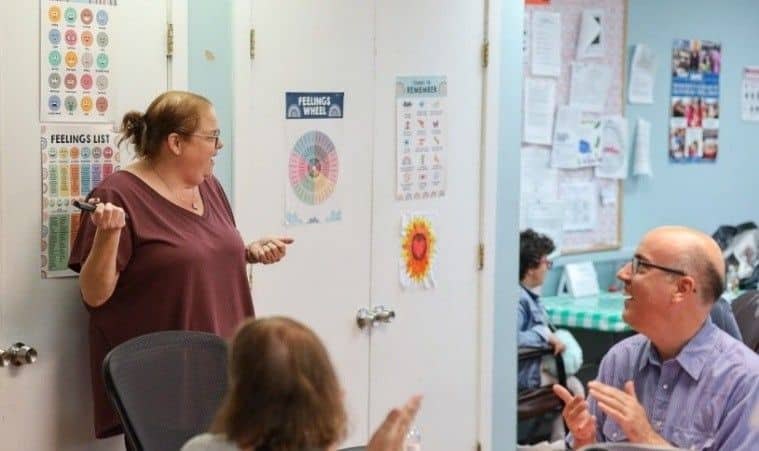
Through the donation process, Jerri’s kidney ultimately went to another recipient, but ensured Krystie’s name went to the top of a donor list for a kidney that would last her the rest of her life.
“I was 100% positive—no doubts in my head—that I was doing the absolute right thing,” Jerri said. “I didn’t want it to feel heroic. We all show up for each other in different ways—big or small—and this was just my way.”
Jerri encourages people to consider becoming a living donor. “I wish I could say this to everyone: I was walking the night of the operation. It’s not as scary as people think and the supports from the National Kidney Foundation for supplementing your work hours, income, transportation or day care, if you need it, are amazing. I didn’t, but they are so supportive. If anyone is thinking of doing it, it is a very good experience.”
Jerri was out of office about two weeks for the procedure, putting her sick time to good use. “I work at the best place in the world. The agency was supportive of my decision,” said Jerri. “When I came back, I was able to pick up where I left off. The best part of my job is that I am supported to connect back to the various sites and programs where I feel I make a difference.”
Congratulations and Celebrations
Krystie and her mom, Basia, were waiting for Jerri when she woke up after surgery, ready to celebrate. As a result of Jerri’s donation, Krystie had expected to receive a well-matched kidney within four to six months. Instead, Krystie would receive a life-changing phone call, only a few days later.
“I went to dialysis that Friday. I was sitting there, and it was like 4:55 p.m.,” said Krystie. “You get the phone call you have a kidney and everything changes. I had to keep quiet because I was at dialysis and there are people who are never going to get a kidney, there. It’s heartbreaking. I started to cry.”
Krystie first shared the news quietly with a nurse on duty, who had been there when she first began dialysis treatment, then called her mom.
“I called my mom like 8,000 times because she never answered her phone. She ended up calling me back while she was walking out of work with her coworkers,” said Krystie. “The next thing you know you hear her drop the phone, and she’s screaming.”
Basia, who works as a receptionist at Northwell Health, was walking out of the office with her co-workers. “Yes, we were screaming,” she laughed. “Everyone was clapping and dancing behind the medical building and bagel store. Krystie was still on the phone.”
For Dr. Ali, what was most memorable was seeing Krystie’s grit and resilience. “With Krystie, you realize how tough this journey is. She has throughout it maintained her commitment to her health, her drive to take care of these organs, and the gift that she’s been given by those who donated to her. Her desire to help other patients navigate this journey, it was not easy for her and she wants to make it easier for someone else. That sticks with me.”
“I know for patients out there who are looking for a transplant, it is so difficult to make that ask. It is a big ask, and many patients feel very intimidated to say that they need a transplant or to spread the word. But, I encourage people to spread the word because if Krystie hadn’t, Jerri wouldn’t know and would not have been able to be her hero,” said Dr. Ali.
Dr. Campbell of The National Kidney Foundation commended both women. “On behalf of the National Kidney Foundation, I want to congratulate Krystie and Jerri on the courage and generosity that’s being seen here. It’s a journey that really shines an important light on what’s possible when communities rally around kidney health: getting screened, registering as an organ donor, stepping forward as a living donor. We all need this recognition of individuals who value life, health, and their coworkers in such an inspiring manner.”
Consider Becoming a Living Donor like Jerri!
The National Kidney Foundation is celebrating 75 years of transforming kidney care, expanding early detection, improving access to kidney transplants, supporting patients and families every step of the way. To learn more about kidney donation, visit The National Kidney Foundation at www.kidney.org
If you are interested in becoming a living kidney donor, you can complete a confidential health screening for kidney donations. To learn more about kidney donation or to speak with a donor team specialist, call (212) 263-3621 or email NYUTrLiving-Donor@NYULangone.org.
